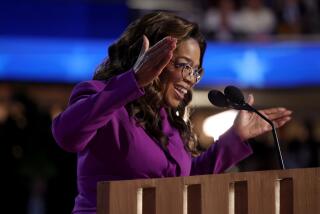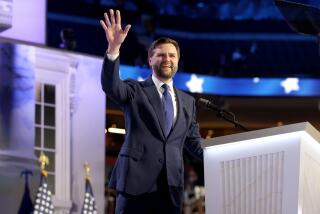Nixon Clinched Spot on GOP Ticket in ‘Checkers’ Speech 40 Years Ago : Vice presidency: The candidate’s woes on campaign funding brought on a tearful TV address and a place in history for a cocker spaniel.
- Share via
WASHINGTON — As Bill Clinton struggles with his draft history and President Bush his tax promises, they might look back wistfully at something that happened 40 years ago last week. Richard M. Nixon, in much worse trouble, talked his way out with a single TV appearance that became famous as the “Checkers” speech.
On Sept. 23, 1952, the newly minted vice presidential candidate of the Republican Party faced allegations that threatened to force him off the ballot and end his political career--the disclosure of an $18,000 fund set up for him by rich businessmen.
Nixon, a first-term senator from California, dealt with the crisis dramatically, gambling everything that the public could be won over to his side with a mixture of pathos and candor in a single speech.
He denied any impropriety in using the private fund. But that part is hardly remembered.
“One other thing I probably should tell you, because if I don’t, they will probably be saying this about me, too,” Nixon told a television audience of 60 million. “We did get something, a gift, after the nomination.”
He explained it was a black-and-white cocker spaniel that 6-year-old Tricia Nixon had named Checkers. “I just want to say this, right now,” said Nixon, in a fight to stay on the ticket with Dwight D. Eisenhower, “regardless of what they say about it, we are going to keep it.”
The “Checkers” speech also included Nixon’s famous reference to wife Pat’s “Republican cloth coat” to point out that she didn’t wear mink. He ended it with a defiant vow not to quit. He urged listeners to tell the Republican National Committee “whether you think I should stay on or whether I should get off.”
The outpouring of sympathetic support cemented his spot on the ticket.
The fund had been set up by Dana Smith, a Los Angeles lawyer who had been finance chairman for Nixon’s successful 1950 race for the Senate. Smith intended it to pay for Nixon’s political travel, printing and mailing of speeches and clerical help, which would not be reimbursed by the Senate.
Once the existence of “the millionaire’s club” exploded in headlines, it ballooned and overshadowed everything else in the 1952 campaign. Eisenhower’s advisers urged the general to dump Nixon and find himself a new running mate.
Nixon got scant comfort from Eisenhower, who told him: “I have come to the conclusion that you are the one who has to decide what to do,” Nixon recalled, in his book “Six Crises.” “I think you ought to go on a nationwide television program and tell them everything there is to tell, everything you can remember since the day you entered public life. Tell them about any money you have received.”
To others, Eisenhower insisted that Nixon prove himself “clean as a hound’s tooth.”
The GOP and the Senatorial Congressional Campaign Committee pledged the $75,000 to buy a half-hour in prime time for Nixon’s speech, which was broadcast from the 750-seat El Capitan Theater in Los Angeles--the same hall where the “Colgate Comedy Hour” and “This Is Your Life” originated.
An hour before he left for the theater, came a call from Thomas E. Dewey, a two-time losing candidate for president and then a member of Eisenhower’s inner circle. He insisted that Nixon end his broadcast with his resignation--and even resignation from the Senate.
“If they want to find out they’d better listen to the broadcast,” Nixon shouted at Dewey. “and tell them I know something about politics too.”
Nixon went on the air in the empty theater. “Not one cent of the $18,000 or any other money of that type ever went to my personal use,” he said. “Every penny of it was used to pay for political expenses that I did not think should be charged to the taxpayers of the United States.”
He listed his assets and his debts, in detail, then said of his wife, “Pat doesn’t have a mink coat. But she does have a respectable cloth coat. And I always tell her that she’d look good in anything.”
The next day, Nixon flew to Wheeling, W.Va., to meet with Eisenhower. Just as he was about to leave the plane, Eisenhower came up the steps.
“You didn’t have to come down here to meet me,” said Nixon.
“You’re my boy,” said the general. And Nixon wept.










